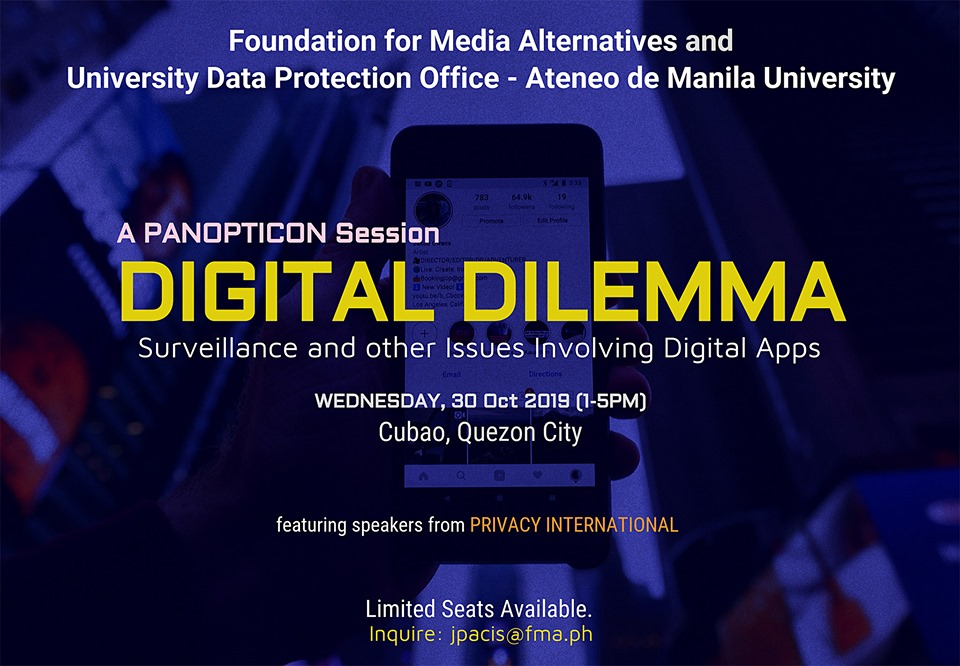Online lenders, expensive internet, digital dilemmas: The FMA Digital Rights Report
Starting this week, the Foundation for Media Alternatives will begin posting regular updates on what Filipinos need to know about their digital rights.
Here’s what you need to know this week:
NPC shuts down 26 online lending companies.
The National Privacy Commission took decisive action when it banned 26 lending apps that unlawfully process lenders’ personal data and publicly shame them for unpaid debts.
The NPC ordered the following online lending companies to stop processing personal data: Cash bus, Cash flyer, Cash warm, Cashafin, Cashaku, Cashope, Cashwhale, Credit peso, Flash Cash, JK Quickcash lending, Light Credit, Loan motto, Moola Lending, One cash, Pautang peso, Pera express, Peso now, Peso tree, Peso.ph, Pesomine, Pinoy cash, Pinoy Peso, Qcash, Sell loan, SuperCash and Utang pesos. (Via NPC)
Online lending apps drew flak for utiizing user data to shame lenders who are not able to pay debts. Agents of these apps will usually call the lenders’ unsuspecting friends or relatives, demand for information or payment of the debt, and ultimately harass both lenders and their contacts, which the app is given access to via the lender’s phonebook. The practice of lending apps brings to the fore Filipinos’ privacy rights and the sufficiency of protections accorded by government and businesses to these rights.
The world’s most expensive internet.
African countries have the least affordable internet, says the Alliance For Affordable Internet (A4AI), an initiative of The Web Foundation. Chad, DR Congo, and the Central African Republic pay more than 20% of average earnings for 1 GB of mobile data. This is in contrast to Egypt’s 0.5% and Mauritius’ 0.59%, the cheapest in the continent. (Via CNN Philippines)
Internet affordability is a key issue of internet governance, related to access and inclusivity of the the internet. Notably, the Philippines also has relatively expensive broadband and mobile data compared to other countries. Competition is scarce, as service providers effectively operate as a duopoly. Only recently, a third telco player was introduced to add competition.
#HandsOffSkimmers!
A video clip of a group of cheerleaders performing as oppressed press workers recently invited harassment and cyberbullying online. As reporters of “Bulan News,” the UP Visayas Skimmers criticized various government officials, including President Duterte, in a now-viral video, which also tackled rice tariffication, the removal of the Filipino subject from the curriculum, and drug war killings, among others.
Highlighting art as protest, the video showed how quickly ‘trolls’ and online commenters barrage online spaces, making them unsafe for some individuals. In the aftermath of the video, photos of the cheerleaders were also shared without their consent and the group itself was red-tagged. Groups such as the UP Visayas Student Councils and Organizations expressed their support against the harassment and cyberbullying of the cheerleaders. (Via Manila Bulletin)
A safer Philippines for kids.
Government agencies and local and international non-profits launched #SaferKidsPh, a 6-year awareness campaign to measure the extent and impact of online sexual exploitation of children (OSEC) in the Philippines. All are invited to take part in the campaign, and to learn more by visiting the website http://saferkidsph.org. (Via Rappler)
OSEC has been a persistent problem in the Philippines, with cybertips of sexual images of children ballooning from 2017 to 2018, and only a few cases reaching court.
Your TV streaming device is also watching you.
Streaming players are just as guilty as apps in tracking your activity online. A Princeton research study on over the top (OTT) streaming devices, such as Roku and Amazon, recently attempted to find out how the two platforms protected viewers’ privacy. The answer?
Not much, as both platforms pervasively tracked viewers’ data, by collecting device serial numbers, WiFi MAC addresses, and SSIDs. It seems like wherever we go online, companies are bent on tracking consumer data and behavior in order to earn profit. (via Fast Company)
What’s new at FMA
- EVENT: Digital dilemma: Surveillance and other issues involving digital apps, with Privacy International (Oct. 30, 2019). There is probably a digital app for every possible purpose or function out there. Increased productivity, enhanced education, and unlimited entertainment options are just some of their acknowledged benefits. But there is also a sinister side to these technological marvels — which is what we hope to tackle in this timely intimate discussion. Email jpacis@fma.ph to inquire.

- New primer on business and human rights released. FMA mapped the policies and practices of ICT companies in the Philippines relating to freedom of expression and right to privacy. We also reviewed the policies and practices of 25 companies, consulted with select business groups, and conducted literature review to map the Philippine ecosystem on digital rights. Read and download here.



0 Comments